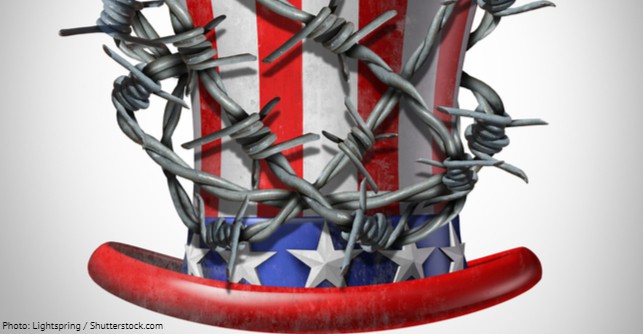The large volume of shared exports and imports between the U.S. and Mexico reflects the “highly integrated” manufacturing supply chain, a Chamber of Commerce official said.
U.S. Chamber of Commerce officials in Washington warned the White House that any closure of the U.S. land border to commercial and passenger traffic would be “destructive to the American economy” and provide “little benefit to security.”
President Donald Trump late last week threatened to shut down the U.S. southern border ports of entry if Mexico failed to gain more control over the influx of Central American migrants transiting the country en route to the U.S.
The chamber noted that the impact on the U.S. economy of a border closure with Mexico would be immediate. In 2018, the Commerce Department reported that U.S. imports from Mexico were valued at $346.5 billion, with the largest commodities from the country being vehicles and parts, electrical machinery and parts, and boilers, machinery and electrical appliances. The U.S. exported about $265 billion worth of goods to Mexico in 2018, with the largest commodities being boilers, machinery and electrical appliances, electrical machinery and parts, and mineral fuels and oils.
The large volume of shared exports and imports between the U.S. and Mexico reflects the “highly integrated” manufacturing supply chain that exists between the two countries’ industries, said Neil Bradley, the chamber’s executive vice president and chief policy officer, in a phone call to reporters on Tuesday.
The Trump administration has suggested just closing the southern border to passenger traffic, while keeping the U.S. ports of entry open to commercial truck and rail traffic.
John Murphy, the chamber’s senior vice president for international policy, said the impact of a blanket closure to legitimate passenger traffic along the southern border — “the most frequently crossed border in the world” — also would be detrimental to the U.S. economy in that it will impact people who travel to the U.S. side each day to work for companies and shop.
The chamber instead urged the Trump administration and Congress to come up with new policies and procedures to better manage the country’s processing of immigrates.
While the White House has not issued any orders to close the southern border, the Department of Homeland Security is working with Customs and Border Protection to reallocate 750 CBP officers and other resources to assist with processing the influx of immigrants currently at the southern border.
Shippers, carriers and customs brokers involved with trade along the southern border said they already are experiencing the effects of this shift in CBP resources through creeping delays in commercial truck traffic at the ports of entry.
“We are using every tool at our disposal, redeploying personnel and resources, and calling on all federal agencies to assist, where possible,” said Homeland Security Secretary Kirstjen M. Nielsen in a statement on Tuesday.
“While only legislation can fix this crisis in the long term, we cannot wait for Congress to act,” she said. “It is our duty to secure the homeland, enforce our immigration laws and uphold our humanitarian obligations. So we are devoting everything we can to that end.”
The DHS authorization from Monday allows for up to 2,000 CBP officers to be temporarily reassigned to immigration control activities at the southern border.
Nielsen also assigned Manuel “Manny” Padilla to lead the DHS effort at the southern border. Padilla is a 30-year veteran of the U.S. Border Patrol, serving most recently as chief of the Rio Grande sector. In September he was appointed by President Trump as director of DHS’ Joint Task Force-West.
Padilla will lead the so-called “Interagency Border Emergency Cell” to improve information sharing and coordinate interagency support to CBP and Immigration and Customs Enforcement efforts to “bring the situation under control,” DHS said.











